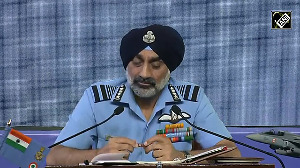It would be an epic waste if India lets go off the opportunities, including the end to nuclear isolation, thrown open by the civil nuclear deal with the US, feels Finance Minister P Chidambaram.
Speaking on the nuclear entanglement, he told students at the Wharton School of the University of Pennsylvania in Philadelphia that he believed India should go ahead and complete the rest of the steps for implementing the 123 agreement.
"I think there are lots of factors favouring the agreement," he said, delivering the Wharton Leadership Lecture at the prestigious B-school.
It is fundamental that India gets access to fuel, which along with the ability to run the 22 nuclear reactors in full capacity, will give it new technology.
Besides, the country has to come out of nuclear isolation, the finance minister said.
"The 123 agreement is the only one of its kind with a nation that is not a signatory to the Non-Proliferation Treaty. If we can access dual technology and raise nuclear power production from 3 per cent to 10 per cent (of total generation), these are opportunities any intelligent country should seize," he said, replying to a question by an Indian-American student.
India was placed under international sanctions after the 1974 nuclear test and the isolation became complete after the 1998 tests.
But the civil nuclear deal will end this segregation even without India signing the NPT.
"This is because of our impeccable record in non-proliferation," Chidambaram noted.
The deal aims to give India access to American nuclear fuel and equipment to help meet its soaring energy needs, but the government's key Left allies are fiercely against it, contending that it would compromise the country's sovereignty.
Earlier when asked about the pros and cons of the deal, Chidambaram said jokingly: "If you want the pros, I can tell you. But if you want the cons, you should invite Prakash Karat."
The 123 agreement needs to be approved by the US Congress, the International Atomic Energy Agency and the 45-nation Nuclear Suppliers Group and the US is keen that it be completed in the life of the present Congress.
"Final steps have to be taken with IAEA and NSG. A final vote by the US Congress is also required... Time is of the essence," US Ambassador to India David Mulford had said in New York on Wednesday while addressing the 'India @ 60: A New Age for Business' conference organised by the CII, USIBC and the Asia Society.





